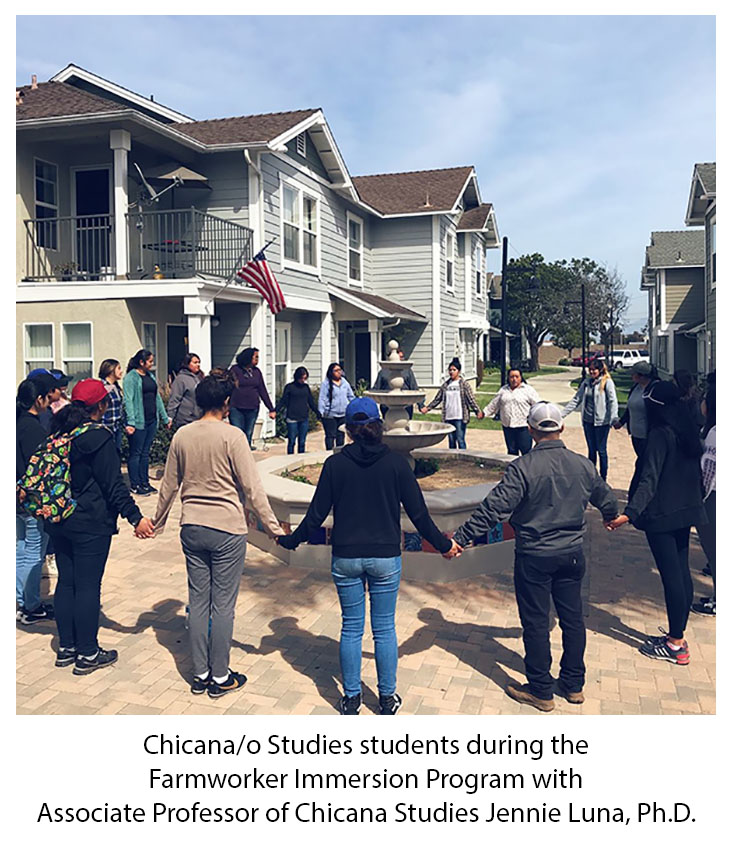 Jan. 14, 2021—Beginning in Spring of 2021, CSU Channel Islands (CSUCI) will require undergraduate students to take at least one 3-unit ethnic studies class. The CSU Chancellor’s Office made the determination that all 23 campuses will require ethnic studies for lower division undergraduates following the passage of AB 1460 in the state legislature.
Jan. 14, 2021—Beginning in Spring of 2021, CSU Channel Islands (CSUCI) will require undergraduate students to take at least one 3-unit ethnic studies class. The CSU Chancellor’s Office made the determination that all 23 campuses will require ethnic studies for lower division undergraduates following the passage of AB 1460 in the state legislature.
A study conducted by three students and two faculty members in 2019 suggests this requirement may help students stay in school and graduate, regardless of their ethnicity.
“I think it’s cool that our little math project that we worked on one summer may make such a difference,” said 2020 Mathematics alumnus Avery Brunk, who is now working on her master’s degree in statistics at CSU Fullerton. “It seems to say ‘You should take more ethnic studies!’”
 Brunk and two other Mathematics majors who graduated at the end of 2019—Katherine Lovekin and Andrew Martos—conducted their research during a Summer Undergraduate Research Fellow (SURF) session with two faculty mentors: Mathematics Lecturer Christina Soderlund, PhD and Professor of Chicana/o Studies Jose Alamillo, PhD.
Brunk and two other Mathematics majors who graduated at the end of 2019—Katherine Lovekin and Andrew Martos—conducted their research during a Summer Undergraduate Research Fellow (SURF) session with two faculty mentors: Mathematics Lecturer Christina Soderlund, PhD and Professor of Chicana/o Studies Jose Alamillo, PhD.
The student research project found that graduation and student retention rates are higher for students who take at least one Chicana/o Studies course, a result that extended across ethnicities, gender and major. It also made no difference whether the undergraduate was a transfer student or had entered CSUCI as a freshman.
Using CSUCI student data from fall of 2011 to fall of 2019, the team compared the student population as a whole versus students who had taken at least one Chicana/o Studies class.
“We had anecdotal evidence that the Chicana/o Studies Department was making a difference, so we thought maybe there were some relevant numbers to back that up,” Brunk said. “Success is a really hard thing to determine mathematically.”
The group decided to consider student retention—which means staying school—and graduation rates as their measures of student success.
The graduation rate among Hispanic freshmen at CSUCI as a whole was 54.32% compared with Hispanic freshmen who took Chicana/o Studies, which was 69.1%. Graduation rates for non-Hispanic freshman on campus was 59.02% compared with 70.27% of non-Hispanic freshmen who took Chicana/o Studies.
The graduation rate among Hispanic transfer students was 66.12% compared with a 71.26% rate for Hispanic transfer students who took Chicana/o Studies. For non-Hispanic transfer students, the rate was 69.53% versus 84.93% among non-Hispanic transfers who took Chicana/o Studies.
“That’s a statistically significant number that blew us away,” Soderlund said. “Most interesting was ethnicity. The students who did well weren’t necessarily all Hispanic students. Non-Hispanic students did well, too.”
Chair and Professor of Chicana/o Studies José Alamillo, Ph.D., believes ethnic studies spark curiosity and open minds, two qualities that serve students of all ethnicities.
For Latina/o students, Chicana/o Studies offers them a chance to explore their own roots, and develop connections with others who share their cultural background, Alamillo said.

“These courses appeal to Latina/o students so they learn about their own history and culture,” Alamillo said. “It empowers them to make connections with others who share that culture. It validates their experiences and builds confidence.”
For non-Hispanic students, Alamillo believes ethnic studies broadens their horizons and creates empathy for another culture.
“By being around and learning theses histories, it helps them to better integrate into a multi-racial society and perhaps become an ally,” Alamillo said. “It makes them more well-rounded and open-minded.”
Beyond showing the value of ethnic studies, Brunk believes the project also shows how many ways mathematics can be used to illustrate patterns everywhere.
“It’s fun to me! I’m a nerd, and I own it,” Brunk said. “I was able to use numbers in a way I never got to use them before.”
